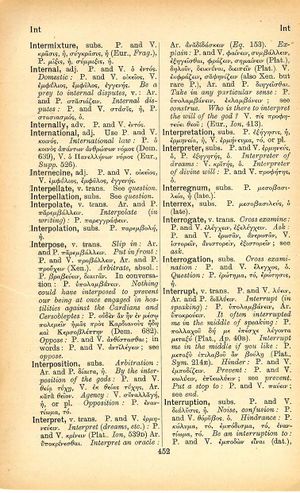interrex: Difference between revisions
Χωρὶς γυναικὸς ἀνδρὶ κακὸν οὐ γίγνεται → Non ullum sine muliere fit malum viro → Kein Unglück widerfährt dem Mann, der ledig bleibt
(6_8) |
(D_5) |
||
| Line 5: | Line 5: | ||
{{Lewis | {{Lewis | ||
|lshtext=<b>inter-rex</b>: rēgis, m.,<br /><b>I</b> one [[who]] held the [[regal]] [[office]] [[between]] the [[death]] of one [[king]] and the [[election]] of [[another]]; a [[regent]], [[interrex]], Liv. 1, 17; 1, 32.—<br /><b>II</b> During the times of the [[republic]], one [[who]] held the [[supreme]] [[power]] from the [[death]] or [[absence]] of the [[chief]] magistrates [[till]] the [[election]] of [[new]] ones: L. [[Flaccus]] [[interrex]] legem de [[Sulla]] tulit, Cic. Agr. 3, 2, 5; id. Leg. 1, 15, 42; id. Dom. 14, 38: prodere, to [[nominate]], [[appoint]], id. Agr. 3, 2, 5: creare, Liv. 5, 31, 8: infestam patribus plebem interreges cum accepissent, id. 7, 21. | |lshtext=<b>inter-rex</b>: rēgis, m.,<br /><b>I</b> one [[who]] held the [[regal]] [[office]] [[between]] the [[death]] of one [[king]] and the [[election]] of [[another]]; a [[regent]], [[interrex]], Liv. 1, 17; 1, 32.—<br /><b>II</b> During the times of the [[republic]], one [[who]] held the [[supreme]] [[power]] from the [[death]] or [[absence]] of the [[chief]] magistrates [[till]] the [[election]] of [[new]] ones: L. [[Flaccus]] [[interrex]] legem de [[Sulla]] tulit, Cic. Agr. 3, 2, 5; id. Leg. 1, 15, 42; id. Dom. 14, 38: prodere, to [[nominate]], [[appoint]], id. Agr. 3, 2, 5: creare, Liv. 5, 31, 8: infestam patribus plebem interreges cum accepissent, id. 7, 21. | ||
}} | |||
{{Gaffiot | |||
|gf=<b>interrēx</b>,¹¹ ēgis, m., interroi : <b> a)</b> magistrat qui gouvernait jusqu’à la nomination d’un roi : Liv. 1, 17, 10 ; 1, 32, 1 ; <b> b)</b> sous la républ., jusqu’à l’élection des consuls nouveaux : Cic. Agr. 3, 5 ; Leg. 1, 42. | |||
}} | }} | ||
Revision as of 06:38, 14 August 2017
English > Greek (Woodhouse)
subs.
P. μεσοβασιλεύς, ὁ (late).
Latin > English (Lewis & Short)
inter-rex: rēgis, m.,
I one who held the regal office between the death of one king and the election of another; a regent, interrex, Liv. 1, 17; 1, 32.—
II During the times of the republic, one who held the supreme power from the death or absence of the chief magistrates till the election of new ones: L. Flaccus interrex legem de Sulla tulit, Cic. Agr. 3, 2, 5; id. Leg. 1, 15, 42; id. Dom. 14, 38: prodere, to nominate, appoint, id. Agr. 3, 2, 5: creare, Liv. 5, 31, 8: infestam patribus plebem interreges cum accepissent, id. 7, 21.
Latin > French (Gaffiot 2016)
interrēx,¹¹ ēgis, m., interroi : a) magistrat qui gouvernait jusqu’à la nomination d’un roi : Liv. 1, 17, 10 ; 1, 32, 1 ; b) sous la républ., jusqu’à l’élection des consuls nouveaux : Cic. Agr. 3, 5 ; Leg. 1, 42.

